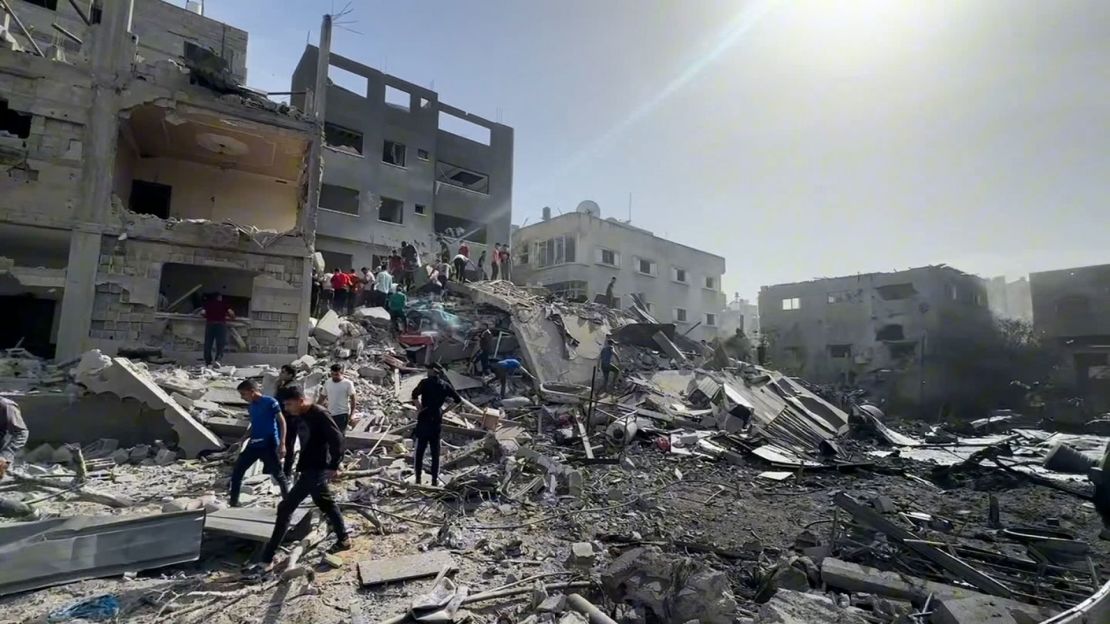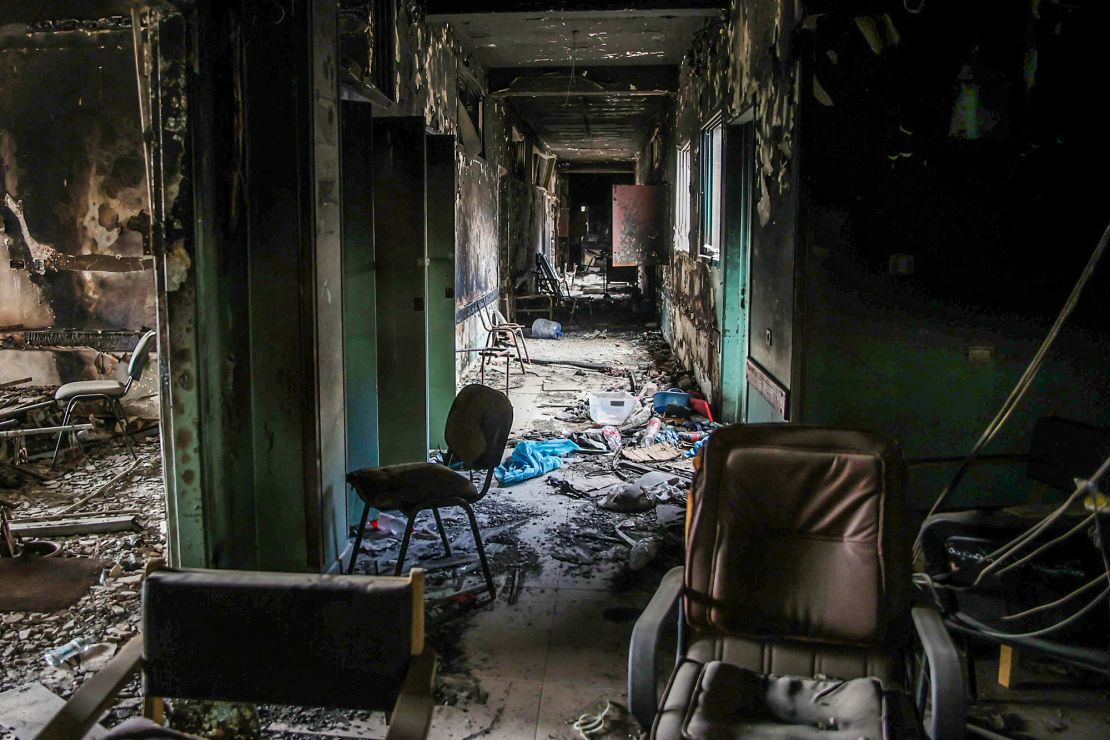Deir al-Balah, Gaza
CNN
—
Abu Mohammed stands with red, bleary eyes. Women and young men walk on a muddied pathway as children run between rows of improvised tents in Deir al-Balah displacement camp, central Gaza.
Mohammed and others staying in makeshift displacement camps have survived Israeli bombardments that have laid waste to Gaza’s streets for over a year, enduring catastrophic violence, constant killings and disfigurement, and crippling hunger.
As Israel celebrated its killing of Hamas leader Yahya Sinwar this week – with its allies hoping Sinwar’s death will now open a possibility for peace in Gaza – Mohammed and many others remain skeptical it will change their daily reality.
“I do not believe that the war will end with his killing,” Mohammed told CNN, adding that he was “saddened” to hear the news of the death of Sinwar. Israel’s most wanted man, believed to be one of the architects of the group’s October 7, 2023 attack, was killed by the Israeli military in Rafah, southern Gaza, on Wednesday.
Sinwar was a divisive figure to Palestinians: a militant hardliner, Sinwar was seen as a brutal force by some, a pragmatic political thinker by others, and a freedom fighter to many.
Born in a refugee camp in 1962, his family displaced from the Palestinian village of Al-Majdal – in what is now the Israeli city of Ashkelon – Sinwar was “a symbol of the Palestinian people,” in Mohammed’s view and that of many others.
Many Gazans today are afraid to publicly voice support for Sinwar and Hamas for fear of being targeted by the Israeli military — which launched its siege of Gaza with the stated aim of destroying Hamas after it led the October 7 terror attacks, and to save the hostages taken that day. Others fear condemning Hamas, which controls the Palestinian enclave.
But Samah, 36, told CNN that she saw Sinwar’s acts as crimes, for which Gaza had borne the human cost.
“Sinwar was a target for Israel and he was targeted and killed. He attacked Israel, and committed crimes that we have paid the price for … We paid with horrific tragedies, with the blood of our children, our money, and our homes.”
She too said she had little hope that his death would be a turning point in the war. “The assassination of leaders seems to change nothing. (Israeli Prime Minister Benjamin) Netanyahu wants more and more people to be killed. We wish to live in security, peace, and stability,” she said.

CNN pieces together visual evidence from Sinwar’s death
Sinwar’s death has prompted speculation among Western allies over whether the coming weeks could signal the beginning of the end of fighting in Gaza, and the release of 101 remaining Israeli hostages.
But Netanyahu has given no signal he is ready to end the war. And Hamas has vowed to continue fighting.
Akram Dabbour, another displaced man in Deir al-Balah, told CNN he did not expect change. He received the news of Sinwar’s death with “deep sadness and pain because (Sinwar) is a noble resister” – and predicted he would soon be replaced. “Israel has become accustomed to killing. I do not believe that the war will end after his death, because a leader gives birth to leaders,” Dabbour added.
On Thursday, the Israel Defense Forces released drone footage that it said shows Sinwar in his final moments. The edited video shows the interior of a hollowed-out building, where a man that the IDF identifies as Sinwar can be seen perched alone on an armchair.
In the footage, the figure’s face is obscured by a scarf and covered in a thick layer of dust. His right arm appears to be injured, as he turns toward the drone. He is holding what the IDF described as a piece of wood, before throwing it toward the lens.
The footage appeared to show Sinwar at his weakest – alone and nearing defeat. But that’s not how most Palestinians see it, according to Mustafa Barghouti, a physician and an independent Palestinian politician.
“He was not hiding behind Palestinian civilians, taking them as human shields, as Israeli propaganda used to say… He was not hiding behind Israeli prisoners or captives, as they also claimed,” Barghouti told CNN’s Christiane Amanpour.
“This image will make him look like a hero for most Palestinians,” Barghouti added, explaining that Sinwar’s apparent defiance in his final moments would be perceived by Palestinians as part of a broader historical resistance, even among those who did not agree with the Hamas leader’s tactics.
Like Sinwar, at least 70% of residents in Gaza are refugees, or descendants of those uprooted by al-Nakba, or “the catastrophe,” according to Amnesty International, when about 700,000 Palestinians were forcibly expelled from their homes during the creation of Israel in 1948.

Decades later, those same descendants are grappling with the same reality of being unable to return to their homes in Gaza, with an estimated 69% of buildings in the enclave now destroyed or partly damaged, according to the CUNY Institute.
For Abu Fares, one of hundreds of thousands prevented from returning to their homes, Sinwar’s death is just a continuation of a brutal war. “It will not stop the battle or the fighting, because the children who carried their father’s dismembered body and those who carried their sister’s dismembered body — what do you expect from them after 20 years?”
Sinwar’s killing comes as the humanitarian crisis in Gaza spirals and the death toll from Israeli airstrikes continues to rise.
At least 42,500 people have been killed since October 8, 2023, with another 99,546 injured, according to the Ministry of Health in Gaza. At least 1.9 million of Gaza’s 2.2 million people have been displaced, according to the UN.
Entire families have been erased, with many neighborhoods reduced to wastelands of thick sewage pools. More than a million people in northern Gaza are facing a looming famine compounded by Israel’s aid restrictions, the UN warned earlier this year.
Suha Al Turk, a young woman displaced in Deir al-Balah told CNN: “Israel claims that he (Sinwar) is one of their targets and that after his assassination, the war will stop. But the war will not stop… They are exterminating civilians – we are the ones living through the massacres every day.”

Around 70% of Palestinians killed by Israel’s strikes are women and children, according to the Hamas-run Government Media Office (GMO). More than 17,000 children have been killed in the Israeli attacks since October 8, the office said.
Israel has said that its sustained military campaign in Gaza is designed to root out what remains of Hamas, following the Hamas-led attacks that killed 1,200 people in Israel and saw more than 250 people abducted, according to Israeli authorities.
Israel says it takes steps to minimize civilian harm, like making phone calls and sending text messages to residents in buildings designated for attack. For years, it has also said Hamas fighters use mosques, hospitals and other civilian buildings to hide from Israeli attacks and launch their own – claims that Hamas has repeatedly denied.
But human rights agencies and many world leaders, including Israel’s allies, have repeatedly raised concerns over Israel’s war conduct and the civilian toll. Groups like Amnesty International also say warnings do not absolve Israel of responsibilities under international humanitarian law to limit civilian harm.
Mahmoud Jneid, also displaced in Deir al-Balah, said the world’s focus should rest on civilian suffering – not Sinwar’s death. “Sinwar was a target. What about us, the displaced? The closure of crossings and the lack of food and drink for children make our situation worse than (his) assassination,” he said.
“I wish Israel would assassinate me too,” Jneid said. “My brothers and family have died, and I wish for my own death so that I can find peace.”
